How can an egg turn into a chick without external help, except a bit of heat from a devoted mother?
The answer is simple: Eggs contain all the basic elements for life: high-quality protein, valuable fat, and unique bioactive compounds.
Dried eggs concentrate all these nourishing treasures, making them a powerful solution to support pet growth and health.
To top it off, dried eggs are convenient, sustainable, label-friendly, and pet parents like them.
What else?
In an eggshell
The structure of eggs is well known, but their essential components may be less familiar.
- The albumen, commonly known as egg white, constitutes around 60% of the egg’s weight. It consists primarily of water and protein.
- The yolk, surrounded by its own membrane, makes up approximately 30% of the weight of the egg. It contains most of the egg’s fat and is a source of lipid-soluble vitamins such as A, D, and E.
- The shell, which has a membrane adhering to its inner surface, is the protective outer covering. It comprises the remaining 10% of the total weight of an egg and is essentially made of calcium.
Dried egg: a concentrate of nutrition
Dried egg is real egg, simply dried. It concentrates all the nutritional benefits of a fresh egg.
Egg powders are obtained by rapid spray drying followed by pasteurization.
This smooth process retains all the components present in fresh eggs, with the same bioavailability and properties.
Moreover, it ensures product standardization, stability, and safety.
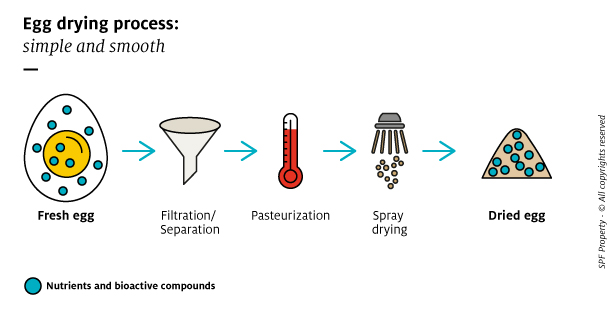
Several dried egg-based ingredients can be obtained depending on the part of the egg that is dried.
With a protein level as high as 80% and fat content that can reach more than 50%, dry ingredients made from egg constitute a convenient toolbox for formulators who can choose the best product(s) to develop and balance their formula.
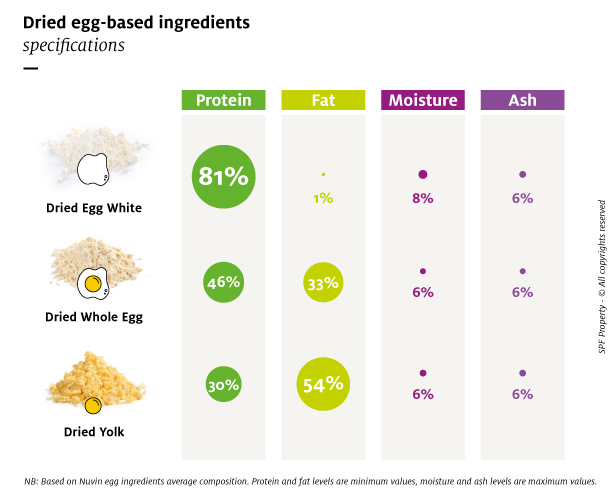
The ideal protein
The major reason dried egg is a nutritional pearl is its superior protein quality.
Egg protein has an ideal amino acid profile that meets all of a pet’s needs*.
*egg contains low levels of taurine, which is required in cat foods per FEDIAF and AAFCO nutrient requirements
Dried egg is a particularly good source of sulfur amino acids such as methionine and cysteine. These compounds, essential to dogs and cats, are often less available in other commonly used protein sources.
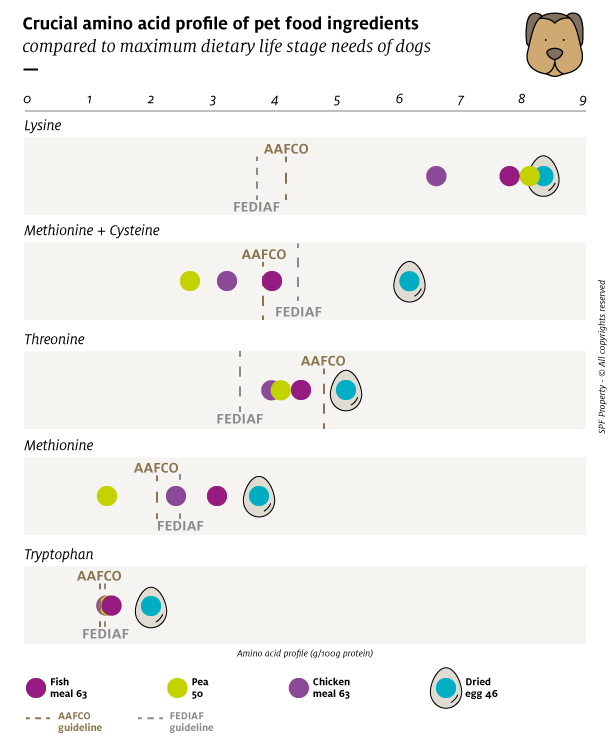
Egg protein is highly digestible and has greater efficacy than most traditional raw materials used in pet food. The precious amino acids contained in dried egg protein are optimally assimilated by animals.
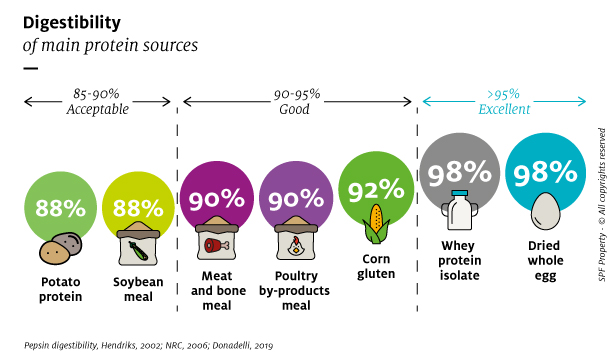
A golden fat
Along with superior protein quality, egg contains a precious fat fully located in the yolk.
Made up of more than 60% unsaturated and polyunsaturated fatty acid, egg fat contains omega-3* and omega-6 essential fatty acids, including linoleic, α-linolenic acid, and DHA.
Dried products derived from whole egg and egg yolk are a good source of lipids essential to dogs and cats.
*Level of omega-3s, especially DHA and EPA, varies according to the diet of the chicken
Bioactive compounds with precious health benefits
Beside its optimal nutritional profile, dried egg contains numerous bioactive compounds that can support cat and dog health.
- Egg contains lysozyme and ovotransferrin, two enzymes with strong antibacterial qualities.
- Egg offers immune-supporting properties. It contains antibodies that help to passively protect against diseases, especially in puppies and kittens.
- Egg contains high levels of both lutein and zeaxanthin, carotenoids that act as natural antioxidants and help preserve optimal cellular function.
- Egg contains phospholipids that are important for cellular membrane composition and repair. Along with anti-inflammatory effects, they may have neurological benefits in senior dogs.
- Egg is also rich in cholesterol, an important component of cell membranes, required for the growth of infants. It is notably involved in the formation of several hormones.
Easy to formulate
Dried egg is an ideal ingredient for formulators to work with.
- Thanks to its unique protein profile, dried egg can balance out variability in the nutrient composition of other ingredients, making it an “insurance” protein in pet food formulas.
- With its high levels of essential amino acids, dried egg can be used at a lower dosage than main raw materials used in pet food.
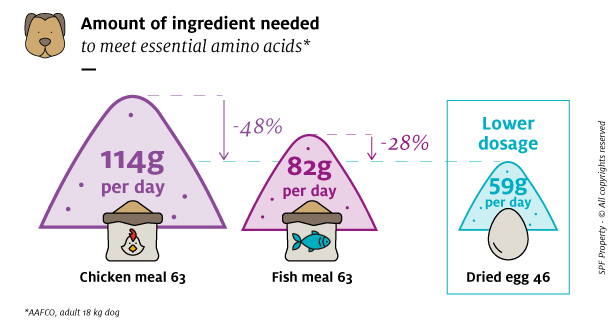
- Egg-based powder also contains low ash levels (less than 6%) compared to meat meals commonly used in pet food. They can easily be included in the pet food formula without exceeding the limit for calcium and phosphorus.
- Dried eggs are compatible with numerous pet food formulas, including diets for pets with sensitive digestion or who eat vegetarian diets.
Easy to handle
Available in powdered, granulated, and pelleted formats, dried eggs can be easily applied into several types of pet food, together with other dry ingredients, without specific equipment.
When made and stored correctly, they have a long shelf life of up to 24 months, ideal for storage, transportation, and formulation.
Sustainable sourcing wisely shared between human and pet
Dried egg-based ingredients are made from the valorization of egg by-products from human food manufacturing.
Turning waste flows from human food into feed grade premium ingredients for pet food contributes to a circular and positive food system. It addresses the issue of protein scarcity while avoiding competition with human food.
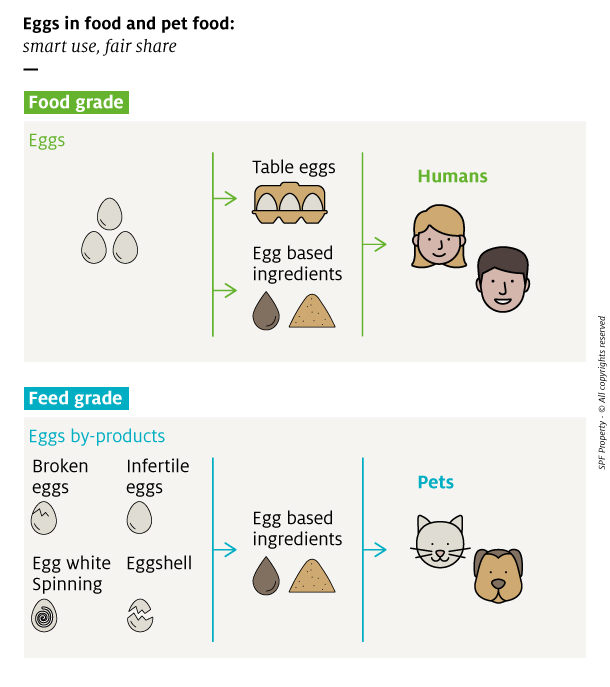
Appreciated by pet parents, label friendly
Pet owner expectations of pet food ingredient quality and origin rise as their nutritional knowledge and eco-awareness increase.
Among all candidates to substitute for traditional protein sources like poultry meal, dried eggs are the most easily recognized and accepted by consumers.

Surveys conducted in NAM and Europe showed that more than 8 out of 10 owners of dogs and cats would agree to feed their pet with egg protein, more than vegetable or insect proteins*.
* Source: Symrise Explorer Global Survey, July 2022 – 1776 cat owners | April 2023 – 1427 dog owners
Pet food manufacturers can easily use dried egg in their formulas and state it on the ingredient list simply as “egg”.
NB: The rules relating to nutritional claims and ingredients listing on the packaging depend on country regulation. They must be followed by pet food manufacturers.
Take-home points
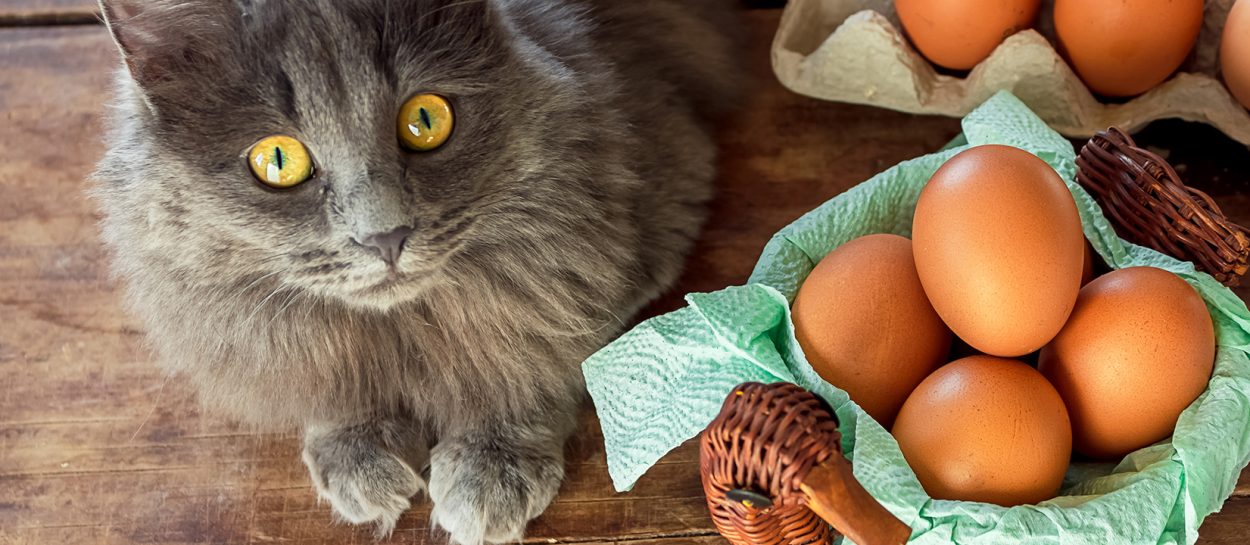



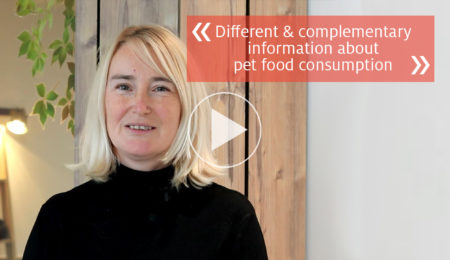
* required fields